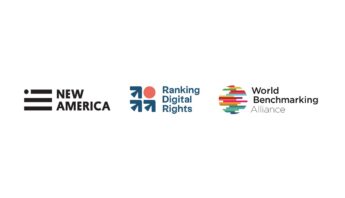On October 19th 2012 we held an initial stakeholder consultation workshop at the New America Foundation in Washington DC to seek feedback on the initial project direction and design from technologists, human rights advocates, socially responsible investors, and experts in corporate ethics and social responsibility. Below is our summary of the workshop discussion, which was held under Chatham House Rule.
(NOTE: At the time we were tentatively calling the project the “Netizen Index” but have since changed its name in response to feedback by stakeholders and project participants.)
Many thanks to Jacky Ahn for taking notes and writing up the initial draft summary.
Vision and Purpose
Citizens around the world are increasingly dependent on digital technology. As a result, companies in the ICT sector exercise strong influence over people’s day to day activities–including those related to free expression and privacy. As demonstrated by the Global Network Initiative’s current efforts, it is possible for companies to apply core principles of free expression and privacy to company policies and practices, to carry out meaningful stakeholder engagement with civil society groups, academics, and socially responsible investors, and to be held accountable to their commitments through an independent assessment process. Several companies have concluded that it is good for their brand reputation and long-term commercial interests to do these things. One of the challenges so far, however, is that companies must voluntarily join the GNI in order to be held accountable to commitments on free expression and privacy. Companies that fail to join GNI (in other words, most companies in the ICT sector including some of the world’s most powerful telecommunications companies and equipment manufacturers) are not being held accountable to core human rights standards related to free expression and privacy in any meaningful way. The Netizen Index project is one attempt to respond to this challenge. The main purpose of the workshop was to figure out the details and the logistics to make this initiative feasible.
Participant Comments
Speakers agreed that the idea of developing a system for ranking companies on free expression and privacy could offer opportunities in increasing the transparency to users by systematically revealing the human rights risks in business practices. They were also hopeful that comparing the performances with others in the sector could ultimately lead the companies’ to positively change their approach in handling free speech and privacy on the Net.
A participant coming from an investor’s perspective confirmed the potential of public evaluation of human rights risks. The importance for a business to maintain and renew user trust was underscored as an incentive for the companies to respond and change to such evaluations. Drawing a comparison to the energy sector, the speaker shared that the “social license” to operate in an ICT sector is growing in importance–especially as we see the mainstream investors and ordinary citizens coming to salience on the issues of rights on cyberspace.
The presentations also mentioned that a chasm remains between the mainstream Corporate Social Responsibility (CSR) world and the world of advocacy on digital free expression and privacy. It was noted that mainstream CSR human rights-related initiatives so far traditionally focus on concerns commonly associated with sectors like manufacturing and extractives. Likewise, most Internet free expression and privacy advocacy groups and initiatives are disconnected from the mainstream CSR world’s tactics and experiences in advancing respect for human rights by companies. Some emphasized the importance of GNI and the Netizen Index in addressing this disconnect.
The dialogue also outlined a few notable challenges.
First, one of the speakers pointed out of the general unwillingness many companies show in cooperating with accountability initiatives. A couple of the presenters also raised concerns about the challenges of creating a coherent system for evaluating the diverse universe of ICT companies. It was further noted that the various regional contexts these companies operate under could also present a challenge in making meaningful comparisons. Another concern is the difficulty of finding an agreement–even within the advocacy and internet community– over the definition of a “good” free expression and privacy policy for these companies.
Who: Which Companies?
Rather than focusing on producing an exact list of companies to assess at such an early stage of the project, the discussion revolved around identifying some of the variables that should be considered in company selection that could best serve the purpose of the ratings. The discussion highlighted the general difficulty in creating an adequate list of companies that could be captured by a systematic evaluation of their policies, practices, and concrete actions, yet remain feasible within the project’s constraints. Nevertheless, many optimistically noted that the companies are going to respond due to their concerns over brand equity and reputational risk once a methodology is set–even if some of the details may be challenged. The key, many pointed out, is to be as transparent and public about the process behind the company selection, methodology development, and research methods as possible.
The conversation led to a discussion of identifying the key target audiences the initiative must address to effectively change company behavior. The participants generally agreed that the initiative should recognize three main audiences to work with: 1) investors, 2) NGO’s and institutions and 3) consumers and consumer advocates. It was also noted that the methodology should ideally help to promote a more strategic conversation among the three parties.
What: Criteria & Methodology
In a more granular discussion of the possible criteria and the methodology of the initiative, the participants exchanged insights on the type of questions that could be asked for the data collection. The conversation about the phases of implementation highlighted the importance not only of a preliminary assessment of the companies involved, but also a follow-up process allowing companies to respond to the evaluation.
In regards to the questions themselves, technologists emphasized the need for the questions to address technical design considerations that may affect free speech and privacy. One concrete example was whether or not a mobile phone has removable batteries: a design feature benefitting the rights of users by allowing them to escape surreptitious surveillance when their phones are turned off. The participants also exchanged opinions on some metrics that could effectively capture corporate accountability. A couple of people suggested the idea of using incident reporting and government penalties as part of the criteria. Others responded to this by raising concerns over possible unbalanced results on a global scale due to differences in local socio-political contexts. Several participants concluded that the ratings must capture both “absolute” and the “relative” as accurately as possible in the context of the companies’ “peers, past, and local laws”.
One participant familiar with the EFF’s “who has your back” initiative (which gives several U.S. based companies gold stars for good practices in the U.S.) said that one of the initiative’s most effective questions addressed the company’s involvement in specific free coalitions whose goal is to change laws and policies. The direct result was to create added incentive for the companies to join those specific free speech and privacy advocacy coalitions.
Others offered views on the importance of qualitative analysis. Some argued that a checklist criteria of policy commitments may fail to capture idiosyncrasies of certain scenarios, and suggested that a scenario-focused approach to forming questions and criteria would increase the project’s real-world impact.
How: What it will take
For the final few minutes of the conference, participants briefly shared their ideas on the range of resources that may help the project. They generally agreed that academic and global partnerships will play an important role in the success of the initiative.
Several other questions were raised for further discussion before the meeting was adjourned including the following:
- What should be the research priorities?
- What would be the most effective approach in organizing the principles involved in the research?
- What are the current investor efforts that intersect with the vision of the initiative?



